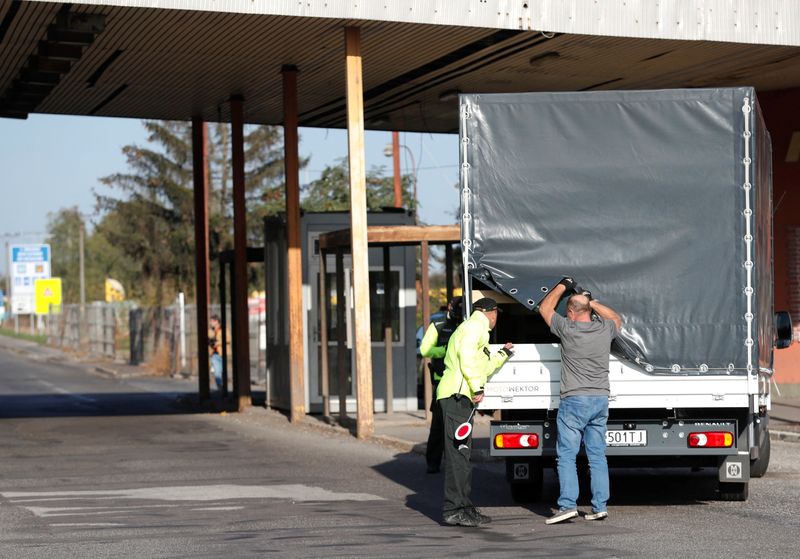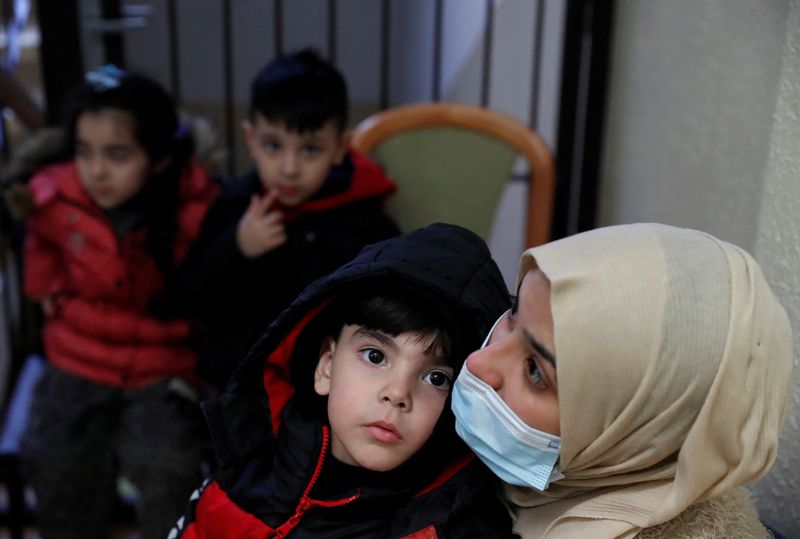By Krisztina Than
NITRA, Slovakia (Reuters) – Illegal migrants kept arriving at a police registration centre in southern Slovakia on Thursday, as border controls imposed by the government appeared not to have deterred smugglers who had dropped them on the Hungarian side overnight.
By 10 a.m. (0900 GMT) Slovak police had detained around 70 illegal migrants and driven them to the registration centre in the town of Nitra, about 80 kilometres (50 miles) from the border with Hungary. They had crossed the green border – a 655-km stretch, partly along the meandering and shallow Ipel river, that is virtually impossible to seal.
Among them was 26-year-old Baraa, from Quneitra in Syria, who came with her husband, five-year-old twins and their younger brother. Worn out by the journey, as she waited for her paperwork to be processed she told Reuters they had tried three times before managing to cross to Hungary from Serbia when an Afghani smuggler cut the steel fence for them at night.
From there a well-oiled network of smugglers picked them up, driving them straight to the Slovak border.
Baraa’s family had lived in Istanbul since 2014 but decided to leave as the money her husband earned was not enough to pay expenses, they did not feel welcome and wanted their children to have better schooling.
“They wouldn’t pay him his salary sometimes, we couldn’t afford rent and they wouldn’t sign up the children in schools as Syrians, they said, until there was a vacancy,” she said, via a translator.
When asked why they chose to go to Germany she said: “Because everybody says Germany is good.”
BALKAN ROUTE TO EU
The small police station in Nitra has registered 300 illegal migrants a day, on average, in recent weeks as the number of migrants entering Slovakia – largely coming from the Middle East and Afghanistan via the Balkans – has risen eleven-fold to nearly 40,000 this year, government data shows.
Police said hardly any of those arriving have proper personal documents.
Migrants waited in detention until their personal data and fingerprints were checked against international criminal databases.
Those who have a clean record get a one-page document proving their registration under a Slovak law that allows Syrians and Afghans – deemed to be refugees fleeing war – to stay. This has been a lure for many migrants, experts have said, giving them a measure of assurance that they cannot be deported from the EU.
Later in the day, police would take them to the train station at Nitra where they get on a train to Germany. The migrants waiting on Thursday all said they were heading there.
TEMPORARY CONTROLS
As the Slovak route became popular, illegal migration to Slovakia was as high in September alone as in all of 2022. Many pay smugglers thousands of euros for the journey from Turkey.
Under pressure to act, Slovakia’s caretaker government on Wednesday imposed 10-day temporary controls on its border with Hungary after Poland, the Czech Republic and Austria tightened their own frontiers with Slovakia.
Germany introduced new controls with Poland and the Czech Republic last week. All are part of the wider EU’s Schengen open-border, visa-free travel zone.
The border controls came just as EU countries on Wednesday sealed a migration deal on how to handle arrivals, taking a step towards overhauling the bloc’s asylum and migration rules before a pan-European election next year.
Poland and Hungary voted against, while their reluctant peers Austria, the Czech Republic and Slovakia abstained. The majority vote went through in Brussels.
Hungarian Foreign Minister Peter Szijjarto said that by pushing for mandatory relocation quotas, Brussels “acts as a magnet for illegal immigrants”, supporting human traffickers’ business models.
“We hope the next European Parliament election will bring leaders who want to stop migration, not invite more migrants to Europe,” he said.
On the Hungarian-Slovak border at the official crossing at Sahy, Slovak police stopped trucks at random on Thursday morning, but traffic was slow.
Around 10 km from Sahy, at the tiny village of Dregelypalank on the Hungarian side of the Ipel river, scattered rubbish and banana skins showed where smugglers had dropped their group early in the morning, near a bridge that is closed and undergoing construction work but can still be used to cross into Slovakia.
(Reporting by Krisztina Than; Editing by Alex Richardson)




